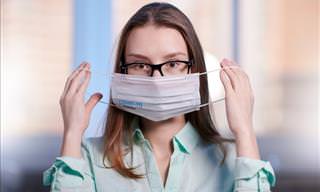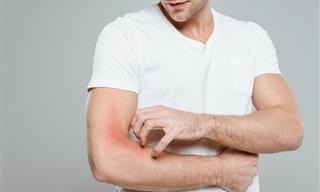1. Rubbing your eyes isn’t harmful as long as it doesn’t hurt
If you have the habit of rubbing your eyes when they get tired, or you rub your eyes a lot due to allergies and think it's fine as long as your eyes aren't particularly red or painful afterward, consider this:
Rubbing your eyes frequently can cause thinning of the cornea, which, in turn, may lead to a condition called keratoconus, a common cause of vision loss. The cornea in people suffering from this condition becomes distorted and bulges out in a cone-like shape, which is what causes early symptoms like blurry and double vision, light sensitivity, and nearsightedness.
2. Reading in dim light will affect your eyesight
Many people think that reading in a dimly lit room can worsen your vision, but there is no evidence of that. Doctors assure that the only symptom of reading under poor light conditions is eye fatigue. With age, we do tend to require more light in order to read because our retinas become weaker, but those are age-related changes and not something brought about by a darker than usual reading environment.
3. Carrots are the best food to eat for good eyesight
Beta carotene is the component in carrots that helps maintain good eyesight because it's converted into vitamin A in our body, which is crucial for eyesight. Interestingly, beta carotene is also the chemical that makes carrots orange. However, carrots are by far not the only vegetable that contains a lot of this very useful antioxidant: spinach, kale, red, orange, and yellow peppers, and even sweet potatoes also contain plenty of beta carotene.
What's more, any other food high in vitamin A, even animal-derived foods like cheese, milk, egg yolks, and liver will have the same benefits for your eyesight, too.
4. Rinsing eyes with water is the best way to relieve dry and itchy eyes
If you're suffering from dry and itchy eyes, be it due to allergies, eye strain, or any other reason, it's important not to resort to rinsing your eyes with water to soothe the uncomfortable symptoms. This is because tap water is full of bacteria and other potentially harmful microorganisms that are typically killed by your digestive juices when you ingest the water.
Unfortunately, your eyes aren't equipped to deal with these germs, so you're risking to introduce an eye infection by rinsing your eyes with lots of water all the time. Instead, doctors recommend artificial tears, which are eye drops specifically manufactured to lubricate dry eyes.
5. Reading a book from up close is easier on the eyes
Bringing a book, laptop, or smartphone closer to see better and read easier is a dire mistake. In fact, this kind of near work increases nearsightedness (myopia), especially in kids. Myopia, in turn, is a known risk factor for many other eye conditions, such as retinal detachment, glaucoma, and cataracts. So, instead of bringing that book or device closer, do the opposite and keep them as far away from your eyes as possible.
6. Putting on eye makeup is safe for your eyes
Eye makeup, such as mascara, eyeliner, and eyeshadow are all manufactured with eye safety in mind, but even the best makeup product should be washed off at the end of the day. The main issue with eye makeup is that, no matter how much you try, it's bound to get into your eyes eventually.
Sometimes, makeup residue can build up in your eyes and clog up the meibomian glands in your eyes, which are tiny oil glands that moisturize the eye and present redness and dryness. So, always wash off your eye makeup as soon as possible and have eye makeup free days from time to time.
7. Laser surgery can get rid of all eye problems
Laser eye surgery is a very popular and effective way to correct one's eyesight, but few people don't know that not everyone is eligible for this procedure. Lasik surgery can correct conditions like myopia (nearsightedness), hyperopia (farsightedness), and astigmatism, but patients suffering from keratoconus, cataract, glaucoma, and macular degeneration aren't suitable for the surgery.
8. Any dark glasses will protect eyesight from UV damage
UV exposure is just as dangerous, if not more, to your eyes than it is to your skin. The Sun's rays affect the macula, the cornea, and the lens, and sun damage can result in:
- Macular degeneration, one of the leading causes of vision loss
- Cataract
- Pterygium, a growth on the eye that may block vision
- Skin cancer around the eyes
- Photokeratitis, a painful corneal sunburn that causes temporary vision loss.
Contrary to popular belief, not all sunglasses with dark lenses can protect you from UV damage, as it is a special coating that shields your eyes from damage, and not the darkened lenses per se. Even many clear glasses contain a UV filter, while many sunglasses don't. The safest way to protect your eyes is to purchase certified UV glasses, as they are clinically tested and will surely work.
9. Eye exams are not necessary if you have no complaints
Vision loss is by far not the only diagnosable condition your eye doctor is trained to spot. During a comprehensive eye exam, a doctor will check your overall eye health. As it is with most conditions, early diagnosis is often the key to fast recovery. Apart from that, eyes are sometimes the first organ to show signs of serious health conditions, such as hypertension and diabetes. So, it's best to sign up for a yearly check.
10. Wearing glasses or contacts with the wrong prescription is not a big deal
Have you ever worn another person's eyeglasses and, all of a sudden, your head started to ache or you started to feel dizzy? Well, guess what? The same feelings, although maybe less intense ones, can happen if you wear the wrong glasses or contact lenses. The main symptoms of wearing the wrong prescription glasses or contacts are increased eye strain, headaches, dizziness, and nausea.
11. Frequent squinting affects your vision
Now, this one is just not true. While frequent squinting to see better can be a symptom of farsightedness or other eye condition, the habit itself doesn't affect your vision in any way. In fact, the worst thing squinting could possibly give you is crow's feet - those small wrinkles around your eyes.
12. Watching TV from up close hurts your vision
Watching a lot of TV, even from up close, is not considered harmful for your eyesight and cannot cause permanent eye damage. Like computer work, prolonged TV screen time can dry out your cornea if you forget to blink and causes eye strain, so get in the habit of taking short breaks from time to time when you're looking at any kind of screen.
 Go to BabaMail
Go to BabaMail




































